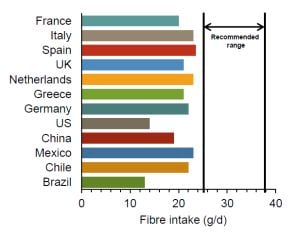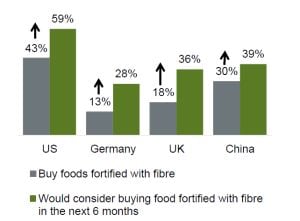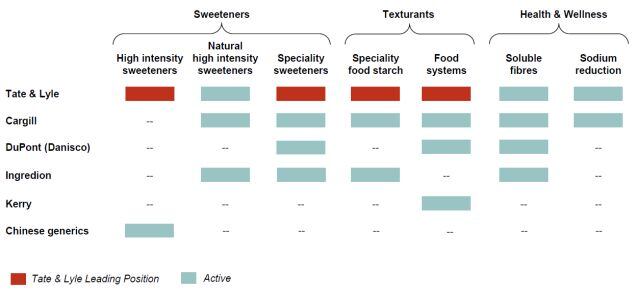Speaking to FoodNavigator-USA after an IFIC survey revealed that two thirds of Americans are unaware that they are not getting enough fiber (click here), SVP new product development Michael Harrison PhD said this did not mean consumers aren’t bothered about fiber.
He added: “Our own surveys suggest that almost half of consumers are seeking to get more fiber. It’s one of the key things they are looking for on the label. The population as a whole is deficient in fiber.”
Even if some consumers don’t understand what prebiotics do, they know fiber delivers health benefits
As for the on-pack claims adopted by manufacturers using Tate & Lyle’s fibers, “the messaging varies”, said Dr Harrison.
“For many customers, it's about making a good source or excellent source of fiber claim, for others it's about more specific digestive health claims, but even if some consumers don’t understand what prebiotics do, for example [Tate & Lyle’s Promitor soluble corn fiber and Sta-Lite Polydextrose both stimulate the growth of ‘good’ gut bacteria in the gut], they know that fiber delivers health benefits.”
From a technical perspective, next-generation fibers such as Promitor are well-tolerated in the gut and can be added to a very broad spectrum of food matrixes from water to yogurt without delivering an unpleasant mouthfeel, added Dr Harrison, who heads up the new product development team at Tate & Lyle’s global innovation center in Hoffman Estates, IL.
But should manufacturers add fiber to anything and everything just because they can, or do consumers only feel comfortable seeing fiber actively promoted in products where they might expect to find it anyway, such as baked goods and cereals?
“From what we’ve seen, the application is not so important. What consumers care about is, does it taste good, and does it have the functionality?” said Dr Harrrison.
Our ambition is to be the world’s most innovative developer of specialty food ingredients

As for Tate & Lyle’s broader innovation pipeline, some new ingredients are being developed in-house, while others will be developed by third parties with whom Tate & Lyle is forging partnerships via its open innovation platform, or via acquisitions, he said.
“Our ambition is to be the world’s most innovative developer of specialty food ingredients. But we recognize that Tate & Lyle is not going to invent every best innovation in the marketplace [in-house].”
Meanwhile, Tate & Lyle’s new open innovation website (which went live in January) has already delivered some promising new leads, he revealed. (Click here.)
“But it also serves as a beacon that tells people we are out there looking for opportunities. It's much more efficient than having to go out and try to find all these potential partners ourselves.”

As to the kind of ingredients that Tate & Lyle would consider adding to its portfolio, nothing is off the table, at least in the early stages of the screening process, he adds.
The priority is identifying technically and commercially feasible ingredients or technologies that offer a sustainable competitive advantage, have IP protection and add genuine added value to consumers, he said, not which category of ingredients they are in.
We’re evolving
But do top food manufacturers see Tate & Lyle as the ‘world’s most innovative developer of specialty food ingredients’?

Perhaps not yet, admitted Dr Harrison, but partnerships with firms such as BioVittoria (to develop natural sweeteners from monk fruit) and Eminate (to develop Soda-Lo salt microspheres for sodium reduction) clearly demonstrate the direction in which it’s headed.
On a more practical level, Tate & Lyle has also re-shaped its portfolio to skew more heavily towards specialty rather than bulk ingredients, for example by selling the UK sugar refining business in 2010 and acquiring Biovelop, a Swedish manufacturer of oat beta glucan, in 2013.
“We’re evolving, and our recent history suggests we are on point, and I think our customers have acknowledged that,” he added.
Click here to see our picture gallery of Tate & Lyle's commercial and food innovation center at the Hoffman Estates near Chicago, IL.
Click here to read about the recent sharp drop in sucralose prices.
Click here to read about Soda-Lo.
Click here to read about Purefruit monk fruit.
Click here to read about open innovation at Tate & Lyle.

